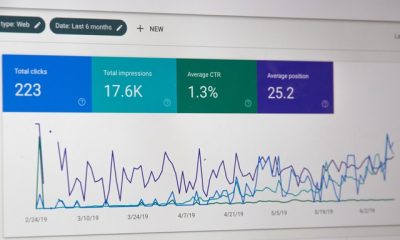Business
3 pillars of business website planning
Before entrepreneurs can have their own corner on the internet, a solid website plan is needed to avoid wasting design money.

I see it all the time. People are excited about their business. They set out to hire a web designer. They share their vision for their website and excitedly wait for the big reveal.
Then, disaster strikes. “You got it all wrong,” they say.
Design dollars are wasted. Revisions begin. Everyone scratches their heads and wonders where it all went wrong. And before you know it what should have been a simple project becomes a nightmare.

Never put those design dollars to waste. (Source)
This doesn’t have to happen to you.
Without a map, it’s easy to get lost in unfamiliar territory. The same is true of website development. Before you begin, you really need to have a solid plan in place.
That’s the real difference between working with a full-service marketing firm or a solo website developer. A marketing firm can help you do the proper due diligence and analysis needed to make sure the website designed for you truly meets your business needs.
Much of the design process breaks down to a few simple steps:
1. Messaging
Who do you serve? Defining your ideal client is one of the most important steps before building a website. The more specific you are about who your ideal client is, the better you’ll be able to speak to their needs when they visit your site.

Before designing a website, know the type of clientele that you will be serving. (Source)
Here are some questions to ask yourself while doing an ideal client analysis:
- Who do you have a passion for serving?
- What are their biggest pains?
- Are they men or women?
- What level at they in their business or situation: newbies, established, or experts?
- What are their values?
- What are their biggest goals?
- What is their personality?
This clarity helps you laser-focus your messaging to speak directly to their needs.
Everyone has the same basic human needs. Knowing and understanding the pains of your target market is critical. Tell them how you will help them overcome their challenges or how your products will alleviate their concerns.
Having credibility is also important. Most prospects haven’t heard about you upon their first encounter with your website. So it’s your job to build trust that you have knowledge and experience and proven results.
Credibility comes through testimonials, media clippings, blog articles and sharing results you have achieved with clients. Showcasing the education, training, and credentials you achieved also shows prospects you have expertise in what you do.
2. Function
Another critical part of the web design and development process is being clear on the website’s function. The layout for your website will vary greatly depending on your business goals.
- What is the goal of your website?
- Will it be an online store?
- Do you want to build a list and online community?
- Will it serve as a free information site where you gain revenues on advertising and affiliate sales?
- Are you selling services?
- Is your website an online brochure?
Once armed with this clarity, your designer will know if you need a landing page, chat tool, email list management software, online booking tool, or other special features in order to support your vision.
Knowing the path you want visitors to go and take the desired action helps your designer put the right elements in place to accomplish that.
3. Look and feel
If you have ever gone shopping in a store with a friend you have probably experienced that we all have very different tastes. The same is true when you design a website.
Even though you have described what you envision, the web designer may have something entirely different in mind. The goal for both of you is to create a visual brand that is appealing to your target market. It needs to immediately say to them they are in the right place.
Before sending your designer a bunch of color swatches and other websites you want your site to look like, the better approach is to create a brand standards guide first that encompasses the colors, fonts, and style of your overall business brand. This process should be done at the time of designing your logo since your logo functions as the base point of your brand.
The key is to remember you are designing a website for your target audience in relation to your business, not for you personally. Yes, for many entrepreneurs, your personality is directly infused into your brand but it is possible the look and feel could be quite different from your personal taste. It all depends on who you are trying to attract to your business.
In saying that, it doesn’t hurt to still send your designer sample websites that you like and be specific about what exactly you like about them. That kind of feedback is very valuable especially with the layout and overall messaging of the site.
The do-it-yourself dilemma
It’s easy to think when you start out doing it all yourself is a better way to save money.
But how much is your time worth? How much do you know about copywriting or effective marketing strategy or design?
How much more revenue could you create if you focused on business building and outsourced your web design and marketing?
Finally, you can’t put a value on the insights and expertise that a marketing team brings to the table. It’s well worth investing in a polished website that converts clients.
Whether you are building your first website or redesigning your existing one, taking time to carefully plan it will save you time, headaches and money.
—
DISCLAIMER: This article expresses my own ideas and opinions. Any information I have shared are from sources that I believe to be reliable and accurate. I did not receive any financial compensation in writing this post, nor do I own any shares in any company I’ve mentioned. I encourage any reader to do their own diligent research first before making any investment decisions.

-

 Impact Investing2 weeks ago
Impact Investing2 weeks agoItaly’s Listed Companies Reach Strong ESG Compliance, Led by Banks and Utilities
-

 Fintech5 days ago
Fintech5 days agoFindependent: Growing a FinTech Through Simplicity, Frugality, and Steady Steps
-

 Impact Investing2 weeks ago
Impact Investing2 weeks agoCDP Approves €1.5 Billion Package to Boost Industry, Renewables, and International Development
-

 Impact Investing7 days ago
Impact Investing7 days agoThe Sustainability Revolution: Driving a Net-Zero, Nature-Positive Economy
![Kevin Harrington - 1.5 Minutes to a Lifetime of Wealth [OTC: RSTN]](https://born2invest.com/wp-content/uploads/2023/12/kevin-harrington-400x240.jpg)
![Kevin Harrington - 1.5 Minutes to a Lifetime of Wealth [OTC: RSTN]](https://born2invest.com/wp-content/uploads/2023/12/kevin-harrington-80x80.jpg)
























You must be logged in to post a comment Login